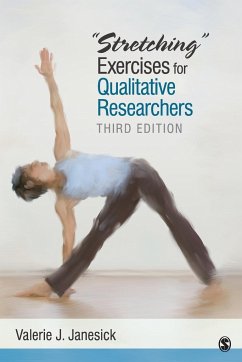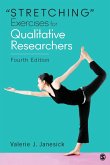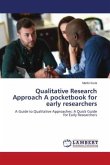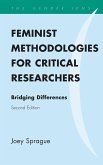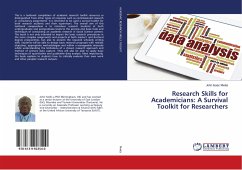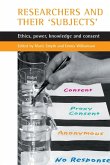Valerie J Janesick
Stretching Exercises for Qualitative Researchers
Valerie J Janesick
Stretching Exercises for Qualitative Researchers
- Broschiertes Buch
- Merkliste
- Auf die Merkliste
- Bewerten Bewerten
- Teilen
- Produkt teilen
- Produkterinnerung
- Produkterinnerung
In this updated version of her innovative and distinctive book, "Stretching" Exercises for Qualitative Researchers, author Valerie J. Janesick extends her dance and yoga metaphors to strengthen her argument that tapping into one's artistic side-the side that is more creative and less inhibited-is fundamental to realizing one's potential as a qualitative researcher. With a focus on developing habits of mind through intuition and creativity, this Third Edition provides a series of exercises that are both imaginative and immensely practical in helping students to see the artistic side of research…mehr
Andere Kunden interessierten sich auch für
![Stretching Exercises for Qualitative Researchers Stretching Exercises for Qualitative Researchers]() Valerie J. JanesickStretching Exercises for Qualitative Researchers105,99 €
Valerie J. JanesickStretching Exercises for Qualitative Researchers105,99 €![Qualitative Research Approach A pocketbook for early researchers Qualitative Research Approach A pocketbook for early researchers]() Martin KuriaQualitative Research Approach A pocketbook for early researchers31,99 €
Martin KuriaQualitative Research Approach A pocketbook for early researchers31,99 €![Feminist Methodologies for Critical Researchers Feminist Methodologies for Critical Researchers]() Joey SpragueFeminist Methodologies for Critical Researchers143,99 €
Joey SpragueFeminist Methodologies for Critical Researchers143,99 €![Formulating Safety Strategies for Peace Researchers Formulating Safety Strategies for Peace Researchers]() Scott MeyerFormulating Safety Strategies for Peace Researchers35,99 €
Scott MeyerFormulating Safety Strategies for Peace Researchers35,99 €![Research Skills for Academicians: A Survival Toolkit for Researchers Research Skills for Academicians: A Survival Toolkit for Researchers]() John Isaac MwitaResearch Skills for Academicians: A Survival Toolkit for Researchers47,99 €
John Isaac MwitaResearch Skills for Academicians: A Survival Toolkit for Researchers47,99 €![Consulting skills for social researchers Consulting skills for social researchers]() Simon HaslamConsulting skills for social researchers24,99 €
Simon HaslamConsulting skills for social researchers24,99 €![Researchers and their 'subjects' Researchers and their 'subjects']() Marie Smyth / Emma Williamson (eds.)Researchers and their 'subjects'43,99 €
Marie Smyth / Emma Williamson (eds.)Researchers and their 'subjects'43,99 €-
-
-
In this updated version of her innovative and distinctive book, "Stretching" Exercises for Qualitative Researchers, author Valerie J. Janesick extends her dance and yoga metaphors to strengthen her argument that tapping into one's artistic side-the side that is more creative and less inhibited-is fundamental to realizing one's potential as a qualitative researcher. With a focus on developing habits of mind through intuition and creativity, this Third Edition provides a series of exercises that are both imaginative and immensely practical in helping students to see the artistic side of research and reflection. Thoroughly classroom tested, these exercises demystify the research process and help researchers become more active observers, interviewers, and learners as they develop and critique their habits of observation, questioning, creativity, writing, and analysis.
Hinweis: Dieser Artikel kann nur an eine deutsche Lieferadresse ausgeliefert werden.
Hinweis: Dieser Artikel kann nur an eine deutsche Lieferadresse ausgeliefert werden.
Produktdetails
- Produktdetails
- Verlag: Sage Publications, Inc
- Artikelnr. des Verlages: B80456P
- Seitenzahl: 320
- Erscheinungstermin: 1. November 2010
- Englisch
- Abmessung: 229mm x 152mm x 17mm
- Gewicht: 466g
- ISBN-13: 9781412980456
- ISBN-10: 1412980453
- Artikelnr.: 30835818
- Herstellerkennzeichnung
- Libri GmbH
- Europaallee 1
- 36244 Bad Hersfeld
- gpsr@libri.de
- Verlag: Sage Publications, Inc
- Artikelnr. des Verlages: B80456P
- Seitenzahl: 320
- Erscheinungstermin: 1. November 2010
- Englisch
- Abmessung: 229mm x 152mm x 17mm
- Gewicht: 466g
- ISBN-13: 9781412980456
- ISBN-10: 1412980453
- Artikelnr.: 30835818
- Herstellerkennzeichnung
- Libri GmbH
- Europaallee 1
- 36244 Bad Hersfeld
- gpsr@libri.de
Valerie J. Janesick (PhD, Michigan State University) is Professor of Educational Leadership and Policy Studies, in the department of Leadership, Counseling, Adult, Career and Higher Education, LCACHE, University of South Florida, Tampa. She teaches classes in qualitative research methods, curriculum theory and inquiry, and ethics in leadership. Her latest book, "Contemplative Qualitative Inquiry: Practicing the Zen of Research (2015) Left Coast Press, argues for the use of Zen approaches to qualitative inquiry cast as Contemplative Qualitative Inquiry. Her chapters in the Handbook of Qualitative Research (first and second editions) use dance and the arts as metaphors for understanding research. Her book, Oral History for the Qualitative Researcher: Choreographing the Story (2010), Guilford Press, incorporates, poetry, photography and the arts to capture lived experience. She serves on the editorial board of The Qualitative Report, and the International Journal of Qualitative Methods. She continues to take classes in yoga and meditation.
Preface
Acknowledgments
About the Author
Chapter 1. Qualitative Research and Habits of Mind
Chapter 2. The Observation and Writing Habit
Exercise 2.1: Observing a Still Life Scene
Exercise 2.2: Physical Description of This Setting
Exercise 2.3: Observation in the Home or Workplace
Exercise 2.4: Description of a Familiar Person or a Stranger
Exercise 2.5: Observing at an Art Museum or at a Movie
Exercise 2.6: Observing an Animal at Home, the Zoo, or a Pet shop
Exercise 2.7: Drawing to Become a Better Observer: Drawing Upside Down
Chapter 3. Advancing the Observation and Reflection Habit
Exercise 3.1: Nonparticipant Observation Assignment
Exercise 3.2: Reflecting to Strengthen the Writing Habit
Exercise 3.3: Writing Your Educational Autobiography
Exercise 3.4: Writing a Pedagogical Letter
Chapter 4. The Interviewing and Writing Habit
Exercise 4.1: Interviewing Someone You Know
Exercise 4.2: Interviewing a Stranger
Exercise 4.3: The Oral History Interview
Exercise 4.4: The Focus Group Interview Demonstration Exercise
Exercise 4.5: Presenting Interview Data as a Found Data Poem
Exercise 4.6: The Digital, Virtual Interview and Google Groups
Exercise 4.7: Interviewing Someone Twice
Exercise 4.8: Practicing an Online Interview
Chapter 5. The Creative Habit
Exercise 5.1: Variations on Writing Your Name
Exercise 5.2: The Camera as an Extension of the Eye, the Eye as an
Extension of the Soul
Exercise 5.3: Building a Collage: My Role as a Researcher
Exercise 5.4: Constructing a YaYa Box or Making a Quilt Patch
Exercise 5.5: Writing About Your Favorite Vegetable
Exercise 5.6: Your Journey
Exercise 5.7: Reflective Journal Writing Practice in Dialogue Form
Exercise 5.8: Haiku and Any Form of Poetry on the Role of the Researcher
Exercise 5.9: Framed Photograph and Narrative Writing Exercise
Chapter 6. The Analysis and Writing Habit: Making Sense of the Data,
Ethics, and Other Issues
Exercise 6.1: Design and Create a Cover for the Researcher Reflective
Journal
Appendixes:
A. Sample Letter to Participants
B. Examples of Researcher Reflective Journals
C. Sample Interview Protocols From a Completed Study
D. Qualitative Research Methods: Sample Syllabus
E. Sample Projects From Various Classes
F. Sample Consent Form Recently Accepted by the Institutional Review Board
G. Conducting Qualitative Interviews: Rules of Thumb
H. Sample Sets of Themes and Categories From a Completed Study
I. Electronic Resources
J. Qualitative Dissertation Costs
K. Sample Member Check Form
L. Samples of Interview Transcripts (Edited)
M. The Analytical Process of Coding
Bibliography
Index
Acknowledgments
About the Author
Chapter 1. Qualitative Research and Habits of Mind
Chapter 2. The Observation and Writing Habit
Exercise 2.1: Observing a Still Life Scene
Exercise 2.2: Physical Description of This Setting
Exercise 2.3: Observation in the Home or Workplace
Exercise 2.4: Description of a Familiar Person or a Stranger
Exercise 2.5: Observing at an Art Museum or at a Movie
Exercise 2.6: Observing an Animal at Home, the Zoo, or a Pet shop
Exercise 2.7: Drawing to Become a Better Observer: Drawing Upside Down
Chapter 3. Advancing the Observation and Reflection Habit
Exercise 3.1: Nonparticipant Observation Assignment
Exercise 3.2: Reflecting to Strengthen the Writing Habit
Exercise 3.3: Writing Your Educational Autobiography
Exercise 3.4: Writing a Pedagogical Letter
Chapter 4. The Interviewing and Writing Habit
Exercise 4.1: Interviewing Someone You Know
Exercise 4.2: Interviewing a Stranger
Exercise 4.3: The Oral History Interview
Exercise 4.4: The Focus Group Interview Demonstration Exercise
Exercise 4.5: Presenting Interview Data as a Found Data Poem
Exercise 4.6: The Digital, Virtual Interview and Google Groups
Exercise 4.7: Interviewing Someone Twice
Exercise 4.8: Practicing an Online Interview
Chapter 5. The Creative Habit
Exercise 5.1: Variations on Writing Your Name
Exercise 5.2: The Camera as an Extension of the Eye, the Eye as an
Extension of the Soul
Exercise 5.3: Building a Collage: My Role as a Researcher
Exercise 5.4: Constructing a YaYa Box or Making a Quilt Patch
Exercise 5.5: Writing About Your Favorite Vegetable
Exercise 5.6: Your Journey
Exercise 5.7: Reflective Journal Writing Practice in Dialogue Form
Exercise 5.8: Haiku and Any Form of Poetry on the Role of the Researcher
Exercise 5.9: Framed Photograph and Narrative Writing Exercise
Chapter 6. The Analysis and Writing Habit: Making Sense of the Data,
Ethics, and Other Issues
Exercise 6.1: Design and Create a Cover for the Researcher Reflective
Journal
Appendixes:
A. Sample Letter to Participants
B. Examples of Researcher Reflective Journals
C. Sample Interview Protocols From a Completed Study
D. Qualitative Research Methods: Sample Syllabus
E. Sample Projects From Various Classes
F. Sample Consent Form Recently Accepted by the Institutional Review Board
G. Conducting Qualitative Interviews: Rules of Thumb
H. Sample Sets of Themes and Categories From a Completed Study
I. Electronic Resources
J. Qualitative Dissertation Costs
K. Sample Member Check Form
L. Samples of Interview Transcripts (Edited)
M. The Analytical Process of Coding
Bibliography
Index
Preface
Acknowledgments
About the Author
Chapter 1. Qualitative Research and Habits of Mind
Chapter 2. The Observation and Writing Habit
Exercise 2.1: Observing a Still Life Scene
Exercise 2.2: Physical Description of This Setting
Exercise 2.3: Observation in the Home or Workplace
Exercise 2.4: Description of a Familiar Person or a Stranger
Exercise 2.5: Observing at an Art Museum or at a Movie
Exercise 2.6: Observing an Animal at Home, the Zoo, or a Pet shop
Exercise 2.7: Drawing to Become a Better Observer: Drawing Upside Down
Chapter 3. Advancing the Observation and Reflection Habit
Exercise 3.1: Nonparticipant Observation Assignment
Exercise 3.2: Reflecting to Strengthen the Writing Habit
Exercise 3.3: Writing Your Educational Autobiography
Exercise 3.4: Writing a Pedagogical Letter
Chapter 4. The Interviewing and Writing Habit
Exercise 4.1: Interviewing Someone You Know
Exercise 4.2: Interviewing a Stranger
Exercise 4.3: The Oral History Interview
Exercise 4.4: The Focus Group Interview Demonstration Exercise
Exercise 4.5: Presenting Interview Data as a Found Data Poem
Exercise 4.6: The Digital, Virtual Interview and Google Groups
Exercise 4.7: Interviewing Someone Twice
Exercise 4.8: Practicing an Online Interview
Chapter 5. The Creative Habit
Exercise 5.1: Variations on Writing Your Name
Exercise 5.2: The Camera as an Extension of the Eye, the Eye as an
Extension of the Soul
Exercise 5.3: Building a Collage: My Role as a Researcher
Exercise 5.4: Constructing a YaYa Box or Making a Quilt Patch
Exercise 5.5: Writing About Your Favorite Vegetable
Exercise 5.6: Your Journey
Exercise 5.7: Reflective Journal Writing Practice in Dialogue Form
Exercise 5.8: Haiku and Any Form of Poetry on the Role of the Researcher
Exercise 5.9: Framed Photograph and Narrative Writing Exercise
Chapter 6. The Analysis and Writing Habit: Making Sense of the Data,
Ethics, and Other Issues
Exercise 6.1: Design and Create a Cover for the Researcher Reflective
Journal
Appendixes:
A. Sample Letter to Participants
B. Examples of Researcher Reflective Journals
C. Sample Interview Protocols From a Completed Study
D. Qualitative Research Methods: Sample Syllabus
E. Sample Projects From Various Classes
F. Sample Consent Form Recently Accepted by the Institutional Review Board
G. Conducting Qualitative Interviews: Rules of Thumb
H. Sample Sets of Themes and Categories From a Completed Study
I. Electronic Resources
J. Qualitative Dissertation Costs
K. Sample Member Check Form
L. Samples of Interview Transcripts (Edited)
M. The Analytical Process of Coding
Bibliography
Index
Acknowledgments
About the Author
Chapter 1. Qualitative Research and Habits of Mind
Chapter 2. The Observation and Writing Habit
Exercise 2.1: Observing a Still Life Scene
Exercise 2.2: Physical Description of This Setting
Exercise 2.3: Observation in the Home or Workplace
Exercise 2.4: Description of a Familiar Person or a Stranger
Exercise 2.5: Observing at an Art Museum or at a Movie
Exercise 2.6: Observing an Animal at Home, the Zoo, or a Pet shop
Exercise 2.7: Drawing to Become a Better Observer: Drawing Upside Down
Chapter 3. Advancing the Observation and Reflection Habit
Exercise 3.1: Nonparticipant Observation Assignment
Exercise 3.2: Reflecting to Strengthen the Writing Habit
Exercise 3.3: Writing Your Educational Autobiography
Exercise 3.4: Writing a Pedagogical Letter
Chapter 4. The Interviewing and Writing Habit
Exercise 4.1: Interviewing Someone You Know
Exercise 4.2: Interviewing a Stranger
Exercise 4.3: The Oral History Interview
Exercise 4.4: The Focus Group Interview Demonstration Exercise
Exercise 4.5: Presenting Interview Data as a Found Data Poem
Exercise 4.6: The Digital, Virtual Interview and Google Groups
Exercise 4.7: Interviewing Someone Twice
Exercise 4.8: Practicing an Online Interview
Chapter 5. The Creative Habit
Exercise 5.1: Variations on Writing Your Name
Exercise 5.2: The Camera as an Extension of the Eye, the Eye as an
Extension of the Soul
Exercise 5.3: Building a Collage: My Role as a Researcher
Exercise 5.4: Constructing a YaYa Box or Making a Quilt Patch
Exercise 5.5: Writing About Your Favorite Vegetable
Exercise 5.6: Your Journey
Exercise 5.7: Reflective Journal Writing Practice in Dialogue Form
Exercise 5.8: Haiku and Any Form of Poetry on the Role of the Researcher
Exercise 5.9: Framed Photograph and Narrative Writing Exercise
Chapter 6. The Analysis and Writing Habit: Making Sense of the Data,
Ethics, and Other Issues
Exercise 6.1: Design and Create a Cover for the Researcher Reflective
Journal
Appendixes:
A. Sample Letter to Participants
B. Examples of Researcher Reflective Journals
C. Sample Interview Protocols From a Completed Study
D. Qualitative Research Methods: Sample Syllabus
E. Sample Projects From Various Classes
F. Sample Consent Form Recently Accepted by the Institutional Review Board
G. Conducting Qualitative Interviews: Rules of Thumb
H. Sample Sets of Themes and Categories From a Completed Study
I. Electronic Resources
J. Qualitative Dissertation Costs
K. Sample Member Check Form
L. Samples of Interview Transcripts (Edited)
M. The Analytical Process of Coding
Bibliography
Index

